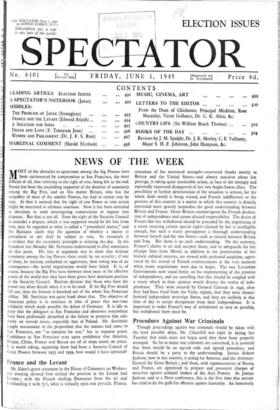Procedure Against War Criminals
Though proceedings against war criminals should be taken with the least possible delay, Mr. Churchill was right in saying last Tuesday that trials must not begin until they have been properly arranged. So far as major war criminals are concerned, it is essential that there should be an agreed code and agreed procedure, and Russia should be a party to the understanding. Justice Robert Jackson, now in this country, is acting for America, and the Attorney- General for Great Britain ; and these, with representatives of Russia and France, are appointed to prepare and prosecute charges of atrocities against criminal leaders of the Axis Powers. As Justice Jackson said at a Press conference, this is the first time that anyone has tried to fix the guilt for offences against humanity. An immensely
responsible task rests with the legal representatives of the principal Powers, for in arriving at a code and agreeing upon procedure they will be establishing historic precedents of international law. Accord- ing to Mr. Churchill, the " movement of thought " is towards trial before an inter-Allied military tribunal. But there are many war criminals besides the political leaders and their principal agents who have to be brought to trial according to the nature and locality of the crime committed—these matters are under discussion by representatives of sixteen Allied nations now meeting in London. There have been crimes in violation of the laws of war committed against Allied armed forces, which presumably will be referred to military courts of the countries injured. Where offences have been committed against citizens of occupied countries—whether by persons of enemy States or by quislings—they will be tried by courts of the country concerned. The feeling is general, and rightly, that action against the criminals should be prompt, short and sharp. Traitors like William Joyce fall in a different category.



























